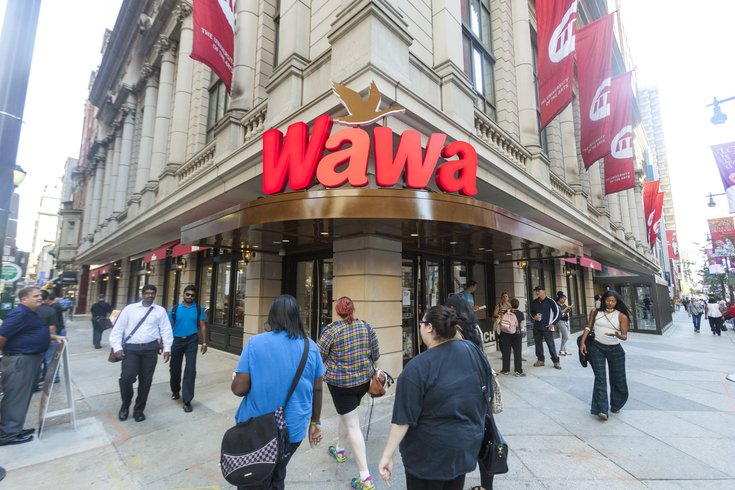
March 10, 2016
 Thom Carroll/PhillyVoice
Thom Carroll/PhillyVoice
Wawa's flagship Philadelphia location at Broad and Walnut streets in Center City.
First things first, is this even a question? Reasonable minds will balk and wonder why anything as self-evident as the greatness of Wawa, our region's convenience store of choice, would be subjected to a discussion about cults, which are usually religious in nature or otherwise involve misplaced, excessive admiration.
On the other hand, sometimes the most obvious facets of culture are exactly the areas most in need of further explanation. They become second nature, and besides, any so-called cult whose tenets are as innocuous as worshipping hoagies and surcharge-free ATMs is harmless enough to inspect without fear of mortification or divine wrath.
In a visually enthralling and revealing look at this "cult of Wawa," Mashable's Amy Lombard breaks down the business evolution and social characteristics that have sustained the Pennsylvania-based chain's incredible momentum over the last generation.
For a chain of more than 645 convenience stores that are all fundamentally the same, Wawa manages to mean different things to different people. It can be the town center where you see your neighbors even when you don’t necessarily want to. Its parking lot can be the unofficial club on the weekends, where teenagers drink Natty Ice. It can feel like your high school reunion when you return home for the holidays.
After a series of interviews at Wawa's headquarters and at retail locations throughout the region, Lombard discovered that the unifying theme from among all of these different associations is family. Somehow, whether because of the goofy name or the iconic Canada goose soaring in the sunset, Wawa succeeded in creating an atmosphere that intimately connects with a broad sense of community across the Delaware Valley and in Florida, where the company strategically expanded beyond its core territory in 2012.
Current Wawa CEO Chris Gheysens, the strong local identification may be a result of a slow-growth strategy that has enabled the company to cement itself locally before spreading around the country.
“You think of a Wegmans, you think of an In-N-Out Burger, they are very slow growth, very deliberate — and I think there’s an element of that cult status that’s attached to that in some regard," Gheysens said. "Just as you get bigger, the focus has to turn more toward efficiency, away from the tailored approach to business and more to the process approach of business. I just wonder how much that can possibly erode the cult relationship you have.”
On some level, the company's appeal comes from its perceived authenticity, an organic branding formation that arguably could not have happened anywhere else. From George Wood's nineteenth-century iron foundry business in New Jersey came the purchase of a red-roofed Victorian home in Delaware County's Wawa, a town whose Ojibwe Native American name translates as "Canada Goose." The Wood family shifted to the dairy business as a milk-delivery company in the 1950's and 1960's and eventually a localized chain concept in Folsom in 1964.
That a modest but well-funded local business became such a smash success isn't too surprising. Woolworth's occupied a similar position in the five and dime realm. The impressive feat is that Wawa achieved such a high level of cultural pervasiveness largely by responding to its customers unabashed love. Before the jingles and marketing campaigns, it was already widely considered a rare gift from above.
If Wawa really is a cult, it may be one of the few you become a part of without ever having officially joined.
Check out the full story at Mashable.